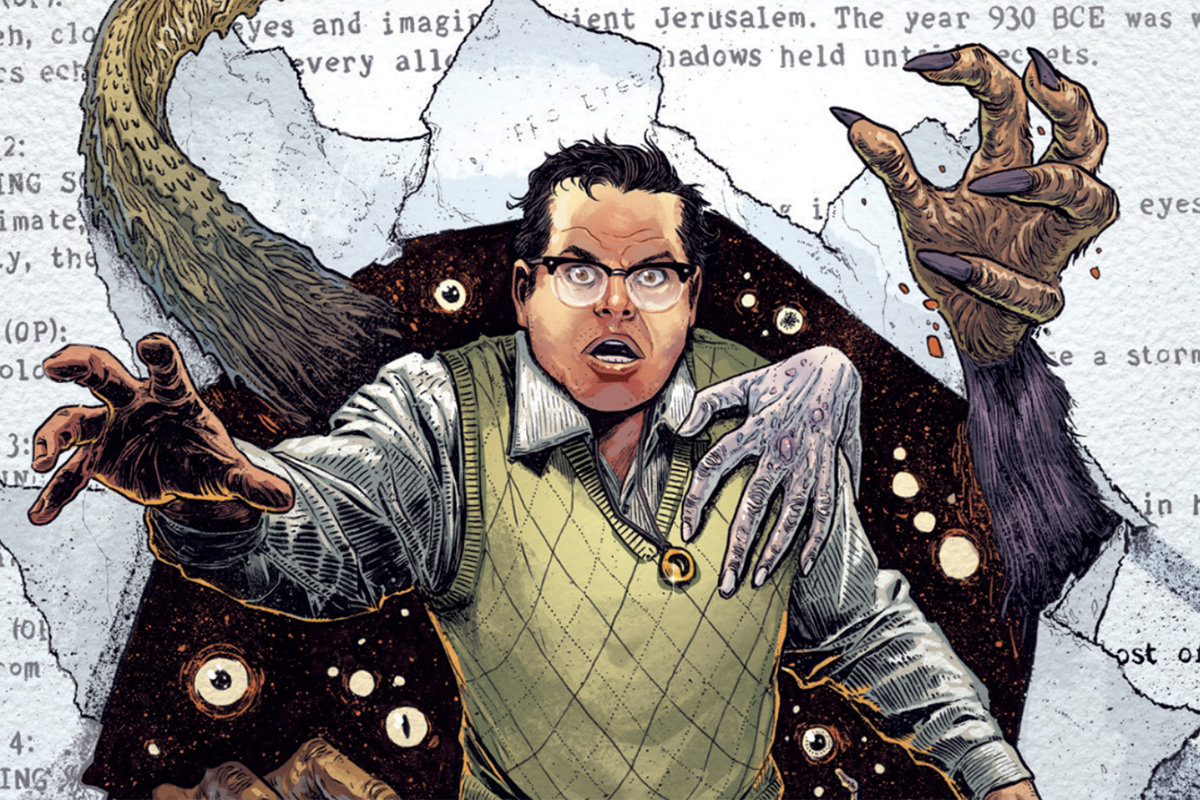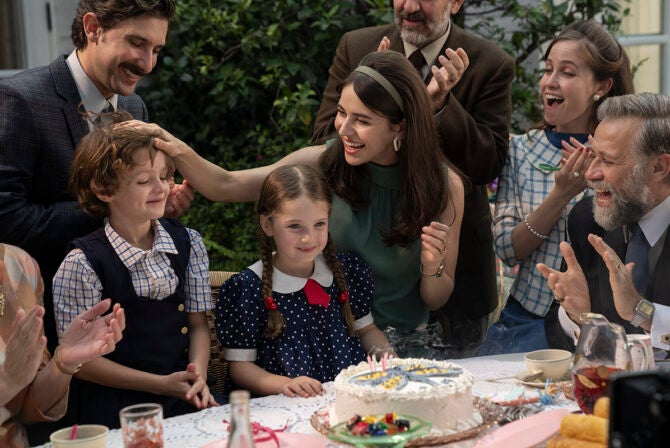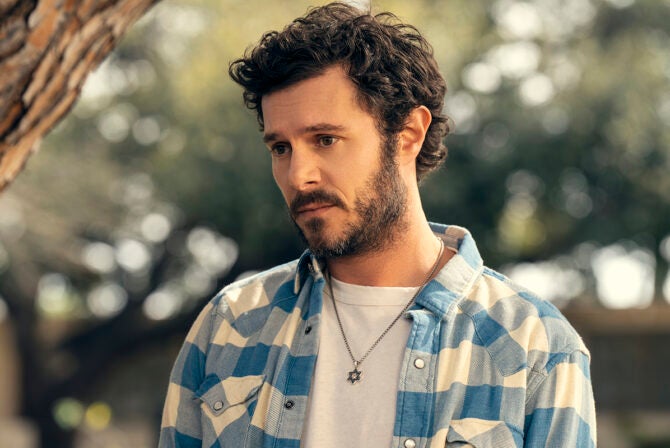The third issue of “The Writer,” co-written by actor Josh Gad (that’s Olaf for you “Frozen” fans), Max and Ben Berkowitz and illustrated by Ariel Olivetti, an incredible cast of Jewish characters and creatures fill the pages, from the demon Lilith to Naama and King Solomon. Leading the quest is a Jewish professor with golem-like powers who eats texts and happens to look a lot like Gad, who fell in love with the project after the Berkowitz brothers cold-called his agent (gotta love that chutzpah!), in part because it was such an overtly and richly Jewish project.
Josh Gad doesn’t look like your average superhero, but that’s part of the charm — “The Writer” is a comic that reverently pays tribute to the history of the superhero trope while also poking fun at and subverting it. Yes, like Clark Kent, the protagonist Stanley Siegel is bespectacled and cerebral, but he also has that curly mop of hair and a more writerly than athletic physique (though anyone who has seen Gad on stage or TikTok knows he moves as powerfully as any superhero). The narration and dialogue are both dramatic and funny. Monsters feel real, and the characters come off the page thanks to the incredible art of Olivetti, an icon in the comics world who has worked on some of the biggest franchises, like Batman, Superman and Daredevil in Marvel and DC, companies started by great Jewish creators and artists.
As has been well-documented, we wouldn’t have American comics as we know them, the superheroes that grace our screens and books and toy aisles, if it weren’t for Jewish creators. Ben Berkowitz tells Kveller over Zoom, “Without Jack Kirby,” born Jacob Kurtzberg on the Lower East Side of New York, “we wouldn’t have comic books.” There’s Jerry Siegel and Joe Shushter who gave us Superman, and Stan Lee, without whom we wouldn’t have my kids’ personal favorite franchise, Spider-Man. The Berkowitzes and Gad pay tribute to both in their hero’s name and throughout this story.
Unlike these great creators, who only occasionally created stories and characters that touch on their complex Jewish identity as the children of immigrants, Gad and the Berkowitz brothers put Jewish identities and stories at the center of this story. Stan is overtly Jewish; he deals with campus antisemitism as a college professor, his ex-wife is an Ethiopian Jew, part of the Beta Israel community, and every aspect of this story is deeply connected to Jewish mythology and history.
Part of what motivated the Berkowitz brothers to create this comic were recent onscreen superhero adaptations featuring characters like Moon Knight. “When Jewish characters make the jump from page to screen,” Berkowitz says, “it’s like their Jewish identity gets put on the back burner.” In Moon Knight’s case, “his father was a rabbi and a Holocaust survivor, but then you move into the show and it’s like an afterthought. There was just one [Jewish] scene at his mother’s funeral.” (One exception here is the Jewishness of the Kirby and Lee-created Fantastic Four character, The Thing aka Ben Grimm, who was recently at the center of a Rosh Hashanah episode of “Marvel’s Spidey and His Amazing Friends.”)
And so, the Berkowitz brothers came up with this idea for a comic that celebrates both Jewish identity and the comic industry’s Jewish roots, that was based on the Jewish myth of the golem, and the first person they thought would be perfect to helm it as protagonist was “the most wonderful human being” they could think of, Josh Gad. It wasn’t the first time Gad had been asked to participate in a comic project, but it was the first time he fell in love with one, and went back and forth with the Berkowitzes about the idea. The Jewish trio then took the project to Dark Horse, the publisher behind “Hellboy,” “Sin City” and “The Umbrella Academy,” who also fell for the project. It was “kismet,” says Ben — or bashert, if you will.
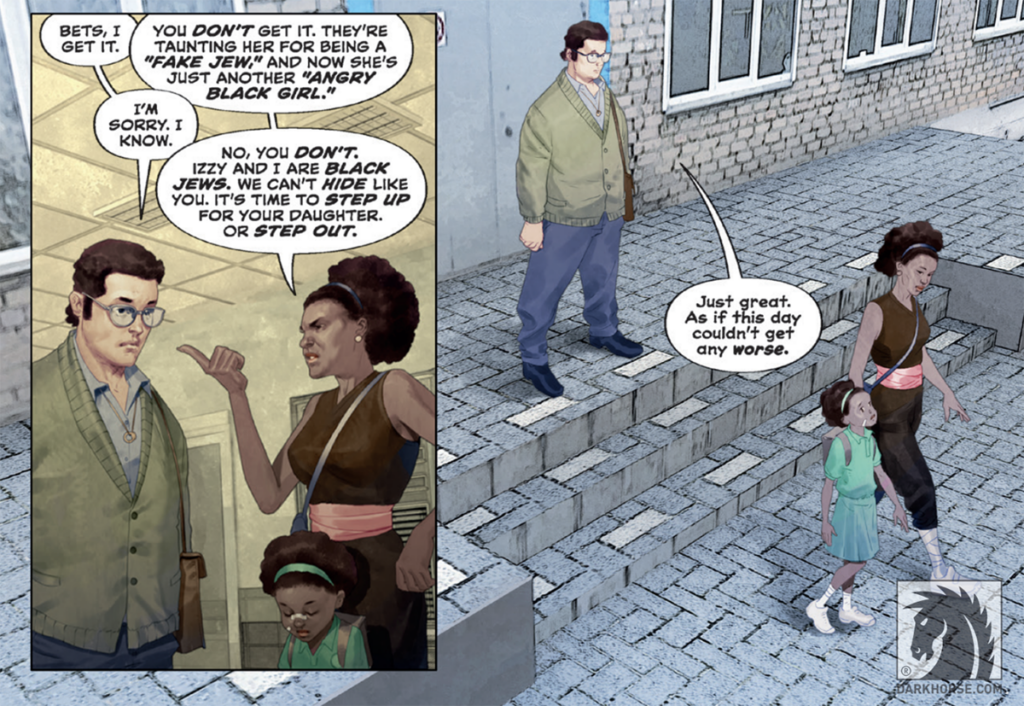
Unlike the Berkowitz brothers, Gad didn’t grow up reading comics but came to love them later in his life. But the three all loved the same movies of their childhood, like “Ghostbusters” and Steven Spielberg’s “Indiana Jones,” a movie with its own share of Jewish mythology, and one whose sensibility and aesthetic you can definitely feel in the pages of “The Writer.”
The brothers grew up in a “not so religious house,” Berkowitz says, but they went to synagogue and had bar mitzvahs. They didn’t know about the rich mythological world of the religion of their childhood, but they loved comics — and the fact that they were created by Jewish artists and writers made them all the more special. They saw in them the stories from synagogue — the story of Superman is the story of Moses. It was comics like Mike Mignola’s amazing “Hellboy” and its movie adaptations, inspired in part by the artist and writer’s Catholic upbringing, that first keyed Berkowitz into how comics can incorporate religious stories, making them funny and relatable. As he grew older, he fell in love with Jewish mythology — the golem, dybbuks, the story of Lilith. He realized how the way demons are viewed in Judaism is so different and unique than the traditional way they’re depicted in the media (the paperback, which comes out next year, will include an illustrated glossary of all the Jewish mythical creatures featured in the comic).
The comic is dense and thrilling — there’s something so exciting about seeing so much Jewishness on the page in that same exciting language, visual and literary, of the most iconic contemporary comics. It’s refreshing to see a complex Jewish man, a divorced writer and father of one who works as a college professor teaching Jewish mythology, who achieves his superpowers by way of eating pieces of paper with Hebrew texts, much like some tales about the golem. And it’s even more refreshing to see the women in his family become even more badass heroes.
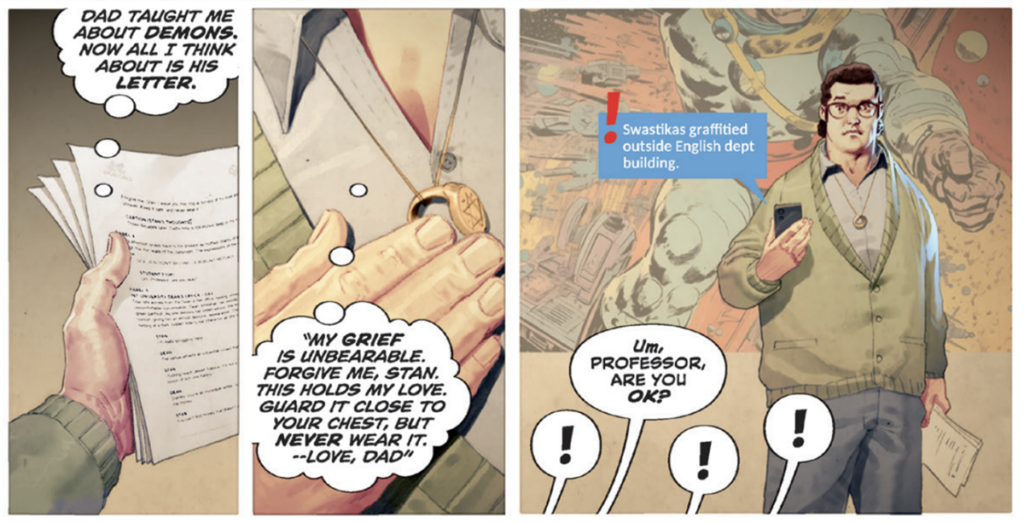
via Dark Horse
“His superpower is to write down any power on a piece of paper and eat it,” Ben says, a nod to the fact that “in Judaism, words are incredibly important… words have so much meaning and the power to create and change. There’s a lot of magic behind words in Judaism.”
Stan Siegel’s superhero origin story is also inspired by an event from Ben’s own childhood. “When I was a toddler, I would eat paper,” he recalls. “And I ate a little mini Torah, or the majority of it.”
The Jewish moments in the comic are plentiful — there are flashbacks to the Holocaust and Jewish history and mythology, as far back as the story of King Solomon. The ring or the seal of Solomon, a significant symbol in Islam and Christianity as well as Judaism, a common element in art and culture and the source of the modern-day Star of David, is a big part of this story, a familiar element that’s a sort of gateway for those not so versed in the Yiddishisms and Jewish creatures of “The Writer.”
And then there are also contemporary references that feel prescient: antisemitic microaggressions, sprayed swastikas and disturbing comments from students. There are violent and virulent neo-Nazis, too, who put themselves in opposition with Siegel.
“This idea came well before October 7, and obviously there was still a rise in antisemitism at that point, but there wasn’t the explosion that there is now,” Berkowitz says. We’re seeing, he says, a “sidelining of Jewish identity — not just comic book characters, but even the actors portraying Jewish characters.” And so it was was important for Gad and the Berkowitzes to tell a story inspired by their own Jewish experience in a relatable way.
“It’s important for us to take a more nuanced approach to tackling antisemitism,” he shared, “so we can get more and more younger readers to see what is happening.”
But ultimately, familial and personal Jewish memories are at the heart of “The Writer.”
Each of the three issues of the comic out so far are dedicated to members of the Berkowitz and Gad family — and many of them are ever-present in the comic itself. There’s Joseph and Evelynn Greenblatt, Holocaust survivors and Gad’s grandparents. There are his daughters, Isabella and Ava, whose imagination and strength he thanks in one issue, and who are echoed in Izzy, Stan’s daughter, whose name is the same nickname he calls his eldest daughter, and who is also just as powerfully imaginative and daring as his girls (who also inspired his recent children’s book, “PictureFace Lizzy”). There’s Ben and Max’s grandparents, Papa and Nana, with whom they would spend even Friday night, reading with their grandmother, sitting in front of the TV and drawing with their papa — who helped them fall in love with the power of stories.
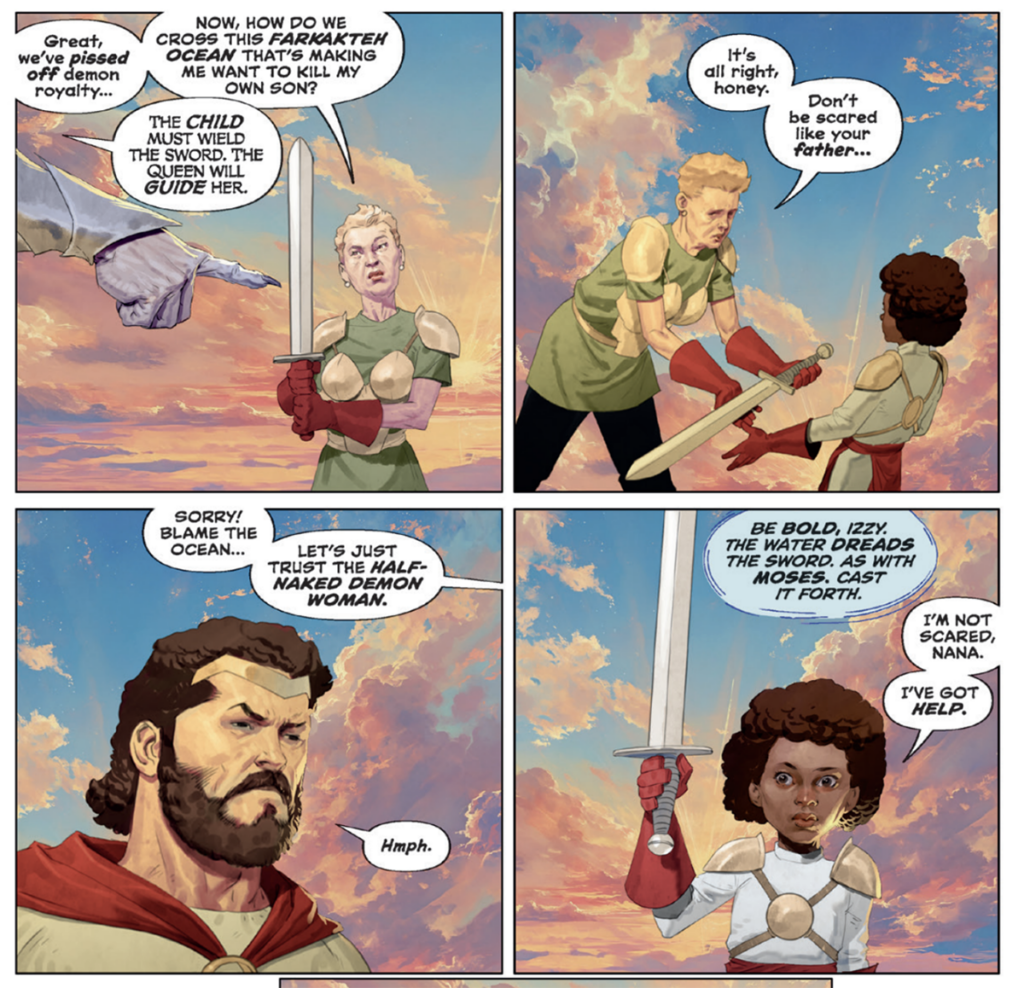
via Dark Horse
Stanley’s mother is inspired, in part, by the Berkowitz brothers’ own mother, a tough woman whom Ben tells me has shaped their lives is wonderful ways, pushing them to follow their dreams and do what they love. Like Liz, she drinks 12 cups of coffee a day and is a cancer survivor. She’s also a real-life hero, a former Boston spinal and neuro-trauma nurse who has helped save lives and who worked the day of the Boston Marathon bombing.
Stan’s distant dad and the mythological power he has over his son is inspired, in part, by the Berkowitzes’ father’s more distant relationship with his own father. One of the most important lessons he passed down to his kids was how important family is. It’s a lesson they learned maybe too well — the two of them work together every day, and they’ve managed to do that pretty well. Their secret is to always remember to say “I love you” in every conversation — which can sometimes get awkward if there’s another person on the line.
The final issue of “The Writer” comes out on October 23, the evening of Shemini Atzeret, which brings with it the end of the High Holidays and Simchat Torah, as well as an end to a beautiful celebration of Jewish history, mythology and family. It’s one that I hope will, like so many great superhero tales, make its way to the screen.
